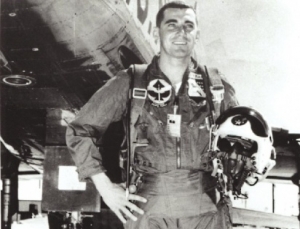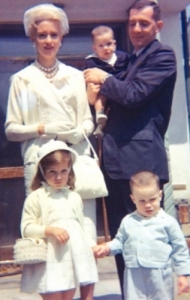Bringing their hero back home ... at last
By Kenneth Fine
Published in News on August 14, 2011 1:50 AM

Submitted photo
Capt. Thomas Reitmann poses for a photograph before taking flight. After he was shot down in Vietnam, the Air Force officer was promoted to major. Now, more than 45 years later, his remains are on their way from Vietnam to Arlington National Cemetery.

Submitted photo
The Reitmann family in 1962. Three years later, Carol, far left, would receive the news that her fighter pilot husband had been lost in Vietnam.
Carol Reitmann locked her car doors as a group, led by an Air Force chaplain, made its way across a parking lot on Seymour Johnson Air Force Base.
She wasn't ready to receive the news she felt certain they had been sent to deliver.
She didn't want her love story to end -- not like this.
"I thought, 'If I don't acknowledge them, if I don't let them in, they can't tell me anything. If they don't tell me anything, nothing has happened,'" she said.
But when the airmen started knocking on her window, the mother of four realized that she couldn't hide forever.
So she opened the door.
"They got in and one of them started to drive. On the way home, they didn't even have to tell me," Carol said. "I knew."
That was 1965.
But it would be decades before she could put a conclusion on the story of what happened to the love of her life.
And only now, after more than 45 years, is he finally coming home.
*
Maj. Tom Reitmann's life was, in many ways, defined by flight.
It was an airplane that brought him into contact with his greatest love, a Braniff International Airways hostess he was drawn to at first sight.
"He was on his way to Dallas, but missed his flight out of Chicago and happened to get on ours," Carol said. "As he got off the plane, he said, 'I'm gonna be here three days. Can I take you out to dinner?' I thought, 'I don't date passengers,' but I didn't want to be rude so I said, 'Oh, I'm in the phone book.'"
But she never expected the phone to ring.
"Well, he called me, and we ended up going out three nights in a row before he left for flight training," Carol said.
And several weeks after he earned his wings, Tom surprised her again -- flying back to Dallas to see the girl who had stolen his heart.
"We saw each other every day for a week and on the last day, he proposed," Carol said. "I thought, 'You know, this is awful fast.' I mean, I was really attracted to him, but I didn't really know him. So I said, 'Let me think about it for 24 hours.'"
But the longer she thought about what the future, with Tom, would look like, the more convinced she became that he was the one.
He was always positive.
He was handsome.
He was a devout Catholic with a set of values Carol had never before seen in a man.
"So finally, I said, 'Yes,'" she said. "It was amazing -- a real whirlwind."
Within a few years, the couple had added three children to their family.
And shortly after Tom was assigned to Seymour Johnson, a fourth was born.
The daughter of a World War II fighter pilot, Carol quickly embraced the military lifestyle.
"I was used to it. When (my father) was training fighter pilots, we only spent six weeks in each place," she said. "You make friends and then you make new friends. It wasn't anything new to me."
And even after her husband left for Vietnam, she found a support system in the other spouses left behind.
From across the world, Tom did his best to stay involved in the family's life.
He sent reel-to-reel audio tapes to his children so they could hear his voice.
He kept his wife up to speed on what was transpiring in the skies -- even if, at times, his tone frightened her.
"He did tell me that many times when the guys were going out to fly a mission, they would throw up on the flight line. They were scared and I don't blame them," she said. "But still, I never thought he wasn't coming home. It didn't even enter my mind until his squadron commander got shot down.
"I wasn't afraid but I was just, I don't know, uneasy, so I prayed a lot. I just wanted him to hurry up and come home."
*
It was Dec. 1, 1965, and Tom was sent on a bombing mission over a "well-defended target," one of his comrades said.
Carol spent the day having tea with a group of spouses before Christmas shopping for her children who were, at the time, at the Seymour Johnson nursery.
She had no idea that news would soon reach her that would forever change her life.
And after the base chaplain and others got in her car and drove her home, she knew that, somehow, she would have to explain to her children that their father might not ever return to their side.
"I told them that Daddy had been shot down and that the rescue people were trying to find him," Carol said. "I didn't tell them that it was fairly certain he was dead."
But when other members of the 334th Fighter Squadron returned from their tour, the fate the wife had not fully accepted was all but confirmed.
Tom's wingman played her a cockpit recording.
"They were yelling to him, 'Eject. Eject. Eject,'" she said.
And he told her how he followed her husband's F-105 down to 2,000 feet -- that it hit the ground and he didn't see a parachute.
"He said, 'You know, I just don't think he made it. I really don't see how he could have gotten out,'" Carol said.
Years went by -- countless months defined by an insignificant amount of hope that maybe, somehow, Tom had escaped the crash unscathed.
"I used to think, when I was little, 'Oh, my dad has amnesia. He just doesn't know who he is and thinks he's Vietnamese, so he's still there," Tom's eldest daughter, Kim, now 52, said. "But after 1973, when the POWs came back, I think that was it. I think we really knew."
So Carol embarked on a journey no mother ever anticipates -- creating, for her children, her husband's legacy.
"I told them he was a wonderful dancer -- that he could sing beautifully," she said. "I told them that he loved life and lived every minute of it."
And then, she moved on.
*
In the years after Tom's family gave up hope that he would, one day, come home, the airman's country decided to find a way to ensure all those left behind were recovered from Vietnam.
And in 2003, the Joint POW/MIA Accounting Command, known throughout the military as JPAC, brought together anthropologists, photographers, linguists and other specialists to work with foreign governments to do just that.
Tom's family, though, never believed that this new unit was the answer to their prayers.
"It just never dawned on us that they would find him," Kim said. "In fact, it was inconceivable that they would -- especially ... on farm land that floods annually. It was just not something that was going to happen."
And then, the call came -- and in a moment, Kim reached back more than 45 years, to the memory of a little girl walking with her dad across the Goldsboro installation they called home.
"He would be holding my hand and people would salute him," she said. "I always thought it was just because he was wonderful -- that they knew just how special he was."
Other memories, though, were lost long ago.
Like the day her father boarded an aircraft bound for Thailand to support the war effort mounting in Vietnam.
Or the moment she, at 6 years old, was told that his F-105 Thunderchief had been shot down.
"I don't remember a lot of what happened. I remember bits and pieces," she said. "It's like, when you're 6 years old, you don't realize what you'll need to remember, so you don't."
But when the man on the other end of an unexpected phone call told her that her father's remains had, more than four decades after the crash, been identified, tears started falling.
"He says that he's with Mortuary Affairs with the Air Force. You hear those words together and the brain starts to click immediately," Kim said. "Then he said ... 'I've spoken with your Uncle Ed and I've spoken with your mother.' The minute he said that, it was just like, I just knew."
Tom's remains had been recovered and identified using a DNA sample taken from his brother.
At long last, he was coming home.
"I just kept saying, 'Are you sure? Are you serious?' I don't think (he) could understand me asking him if he was sure because I was crying so hard," Kim said. "I'm just so amazed at the U.S. Air Force. I don't know any other country in the world that would do what they do for years and years and years to search until they find our service members. That, to me, is just amazing."
*
In less than a month, Tom's remains will be laid to rest at Arlington National Cemetery.
But his wife, children, brother and other family members will not be the only ones at his graveside that afternoon.
"Tom was a special person. I always knew it, but I didn't realize how many other people knew it until his remains were found," Carol said. "Kim started getting e-mails from pilots who flew with him who just thought he was the most amazing thing in the world."
Many of them will be in attendance at that September service.
But Carol insists that, even though many will use the ceremony as a chance to say goodbye, Tom has been with them all along.
The truth is, it's not really a homecoming, she said.
Her first love has been home since the moment his F-105 fell from the skies.
"I am of the belief that this is God's world and it doesn't really matter where we die and are buried, because our soul gets to heaven," Carol said. "So I never worried that he didn't come home, because I knew he wasn't (in Vietnam). He was with God. And that has always been fine with me. It's given me peace.
"But at the same time, it's nice, especially for the children, that he can be in a place they can go and honor him."
